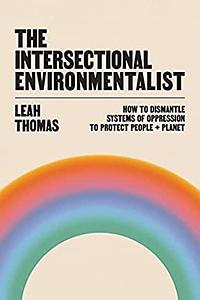You need to sign in or sign up before continuing.
Take a photo of a barcode or cover
553 reviews for:
The Intersectional Environmentalist: How to Dismantle Systems of Oppression to Protect People + Planet
Leah Thomas
553 reviews for:
The Intersectional Environmentalist: How to Dismantle Systems of Oppression to Protect People + Planet
Leah Thomas
really loved the argument at the opening of the book, but I wish the text would have sustained it. The last few chapters didn't feel as unique.
challenging
hopeful
informative
inspiring
medium-paced
I loved the way that this book frames environmentalism as apart of the critical social justice issues of our time, and the way that those with less power in our colonialist, capitalist systems are also at more risk of climate change and ecological harm. This was a fast, easy read that packed a massive punch in terms of impact.
A small book packed with information about how environmentalism needs to be intersectional. And how to make it intersectional; taking into account the way in which multiple forms of discrimination combine, overlap or intersect; advocating for the protection of both people and the planet.
The book is beautiful, clearly structured and full of voices. Thomas gives space for advocates from all over the world, each with a unique perspective. And that goes well in hand with the main message - encompassing all people in environmentalism. The book also offers loads of resources, which is important, as Thomas doesn’t go into environmental problems themselves, instead focusing on the approach that needs to be taken.
The book is beautiful, clearly structured and full of voices. Thomas gives space for advocates from all over the world, each with a unique perspective. And that goes well in hand with the main message - encompassing all people in environmentalism. The book also offers loads of resources, which is important, as Thomas doesn’t go into environmental problems themselves, instead focusing on the approach that needs to be taken.
I think this is a very good primer on intersectionality and privilege as it relates to sustainability. This will be a wonderful tool for all educators to use in practicality. Wonderful representation of identities included.
I was really excited to read this book and so I think part of my rating is the let down that it just didn’t deliver. The book was like a love letter to herself and her coining the term IE and the organization with the same name. Most of the quotes in the book are from her and her fellow cofounders, which doesn’t bode well for the amount of research put into the book. There wasn’t much.
The subtitle of the book is misleading because it just really wasn’t about that (that’s what I wanted to read about). The first half of the book was about how people are/were racist against Black people, and apparently only Black people. And the second half was just the bibliography and a “tool kit” which lists hundreds of resources of I guess where we go and actually find what we thought this book was about? I’m still confused. I thought this book would heavily feature Indigenous voices and specific examples but 95% were only about her and her friends. I think the only mention of what Indigenous people have done for the environment was one paragraph on the Alcatraz occupation which was in the 1960s and I’m pretty sure it’s common knowledge, especially if you are working in the environmental justice space, so again no research. You’d think she’d mention them more considering they’ve been stewards of this land she’s writing about for thousands of years, but it’s like they don’t exist.
She uses the term BIPOC several times and says to make sure we elevate their voices, but at the same time she did the complete opposite and almost never spoke about any other minority group. So I was a bit taken back by her tone and just put off by the lack of representation, which was what she claims to preach the whole book - is to include all the minority groups but she did the exact opposite and rather centered herself and only listed contributions of those similar. She only briefly acknowledges other minorities plight of environmental racism in the short chapter 4.
There’s not much to learn here, it was more just like an intro manual I would say. I don’t normally get annoyed at books, but this is probably one of two or three that really just annoyed me mostly because of her hypocrisy and lack of inclusion.
The subtitle of the book is misleading because it just really wasn’t about that (that’s what I wanted to read about). The first half of the book was about how people are/were racist against Black people, and apparently only Black people. And the second half was just the bibliography and a “tool kit” which lists hundreds of resources of I guess where we go and actually find what we thought this book was about? I’m still confused. I thought this book would heavily feature Indigenous voices and specific examples but 95% were only about her and her friends. I think the only mention of what Indigenous people have done for the environment was one paragraph on the Alcatraz occupation which was in the 1960s and I’m pretty sure it’s common knowledge, especially if you are working in the environmental justice space, so again no research. You’d think she’d mention them more considering they’ve been stewards of this land she’s writing about for thousands of years, but it’s like they don’t exist.
She uses the term BIPOC several times and says to make sure we elevate their voices, but at the same time she did the complete opposite and almost never spoke about any other minority group. So I was a bit taken back by her tone and just put off by the lack of representation, which was what she claims to preach the whole book - is to include all the minority groups but she did the exact opposite and rather centered herself and only listed contributions of those similar. She only briefly acknowledges other minorities plight of environmental racism in the short chapter 4.
There’s not much to learn here, it was more just like an intro manual I would say. I don’t normally get annoyed at books, but this is probably one of two or three that really just annoyed me mostly because of her hypocrisy and lack of inclusion.
informative
hopeful
informative
fast-paced
This was a good book and I appreciated the intersectionalism. As someone who studied environmentalism for my bachelors degree, none of the information was revolutionary to me, but I think it would make really good introductory content to environmentalism, especially from the lens that we need environmentalism to become more intersectional. I probably would have given this book 5 stars if I read it 5-10 years ago. I would recommend this book to anyone who wants to make a difference in the world and sort of considers themselves an environmentalist at least in the way that they're aware of the problems and care about the earth.
Where ecological systems/knowledge and integrated justice meet.
Wow! This book is like a perfect crash course in how to tackle environmental issues with every perspective in mind. More people should read it!!
challenging
emotional
hopeful
informative
inspiring
medium-paced





